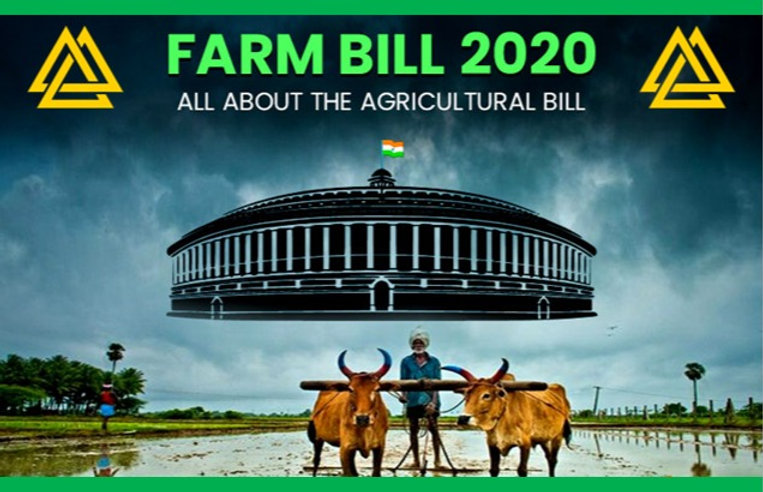Introduction:
The passage of three agricultural bills by the Indian Parliament in September 2020 sparked widespread debates and protests across the nation. Aimed at modernizing the agricultural sector, these bills promised significant reforms but also raised concerns among farmers and stakeholders. In this blog, we will delve into the intricacies of the Indian farm bills of 2020, exploring their objectives, provisions, controversies, and potential implications for the future of Indian agriculture.
- The Farmers’ Produce Trade and Commerce (Promotion and Facilitation) Bill:
- Overview of the bill’s objectives and provisions.
- Explanation of how the bill aims to promote barrier-free trade of farmers’ produce.
- Analysis of the impact on traditional Agricultural Produce Market Committee (APMC) mandis and the concept of free market trade.
- Examination of farmers’ concerns regarding potential exploitation by private corporations and loss of market protections.
- The Farmers (Empowerment and Protection) Agreement on Price Assurance and Farm Services Bill:
- Detailed exploration of the provisions enabling contract farming agreements.
- Discussion on the potential benefits of contract farming for farmers, including assured prices and access to modern technology and inputs.
- Examination of concerns surrounding the imbalance of power between farmers and agribusiness firms, as well as issues related to contract enforcement and dispute resolution.
- The Essential Commodities (Amendment) Bill:
- Overview of the amendments to the Essential Commodities Act, 1955.
- Explanation of how the amendments aim to deregulate the production, storage, movement, and sale of essential commodities.
- Analysis of the potential impact on food security, price stability, and market dynamics.
- Examination of concerns regarding the potential for hoarding, price manipulation, and supply chain disruptions.
- Farmer Protests and Public Reaction:
- Overview of the widespread protests and demonstrations by farmers across India.
- Analysis of the reasons behind farmer opposition to the bills, including concerns about livelihood security, income protection, and the future of agriculture.
- Discussion on the government’s response to the protests and attempts to address farmer grievances.
- Future Implications and Policy Considerations:
- Evaluation of the potential long-term impacts of the farm bills on Indian agriculture, farmers’ livelihoods, and food security.
- Examination of alternative policy approaches and potential amendments to address farmer concerns while promoting agricultural modernization.
- Discussion on the role of stakeholder engagement, dialogue, and consensus-building in shaping the future of Indian agricultural policy.
Conclusion:
The Indian farm bills of 2020 represent a significant attempt to reform the agricultural sector and unleash its potential for growth and modernization. However, the contentious nature of these reforms has led to widespread protests and debates, highlighting the complexities and challenges inherent in agricultural policy-making. As India navigates its agricultural transformation, it is essential to prioritize the interests and concerns of farmers while fostering innovation, sustainability, and inclusive growth in the sector.
- International Perspectives and Comparative Analysis:
- Comparison with agricultural policies and reforms in other countries, such as the United States, European Union, and China.
- Analysis of lessons learned from international experiences with similar reforms, including their successes, failures, and unintended consequences.
- Examination of best practices and policy approaches for balancing market liberalization with farmer protection and rural development.
- Role of Technology and Innovation in Agricultural Transformation:
- Exploration of the potential role of technology, innovation, and digital solutions in enhancing agricultural productivity, sustainability, and resilience.
- Discussion on the importance of investing in research and development, infrastructure, and extension services to support farmers’ adoption of new technologies.
- Analysis of how technological advancements can address challenges related to market access, value chain integration, and climate change adaptation.
- Empowering Farmers Through Capacity Building and Financial Inclusion:
- Examination of the importance of empowering farmers through access to information, training, and financial services.
- Discussion on initiatives to promote farmer education, skill development, and entrepreneurship, particularly among smallholder farmers and marginalized communities.
- Analysis of the role of microfinance, credit, and insurance schemes in enhancing farmers’ resilience to economic shocks and climate variability.
- Pathways to Sustainable Agriculture and Environmental Conservation:
- Exploration of strategies for promoting sustainable agricultural practices, biodiversity conservation, and natural resource management.
- Discussion on the role of agroecology, organic farming, and regenerative agriculture in enhancing soil health, water quality, and ecosystem resilience.
- Analysis of policy instruments and incentives to encourage farmers to adopt environmentally friendly practices and mitigate the impacts of climate change.
- Toward Inclusive and Participatory Agricultural Governance:
- Examination of the importance of inclusive and participatory governance structures in shaping agricultural policy and decision-making.
- Discussion on the need for greater representation of farmers, women, youth, indigenous communities, and other stakeholders in agricultural planning and implementation.
- Analysis of mechanisms for promoting transparency, accountability, and social equity in agricultural governance at local, national, and international levels.
Conclusion:
As India and other countries navigate the complexities of agricultural transformation, it is essential to adopt a holistic and inclusive approach that prioritizes the interests of farmers, promotes sustainability, and fosters innovation and resilience in the agricultural sector. By learning from diverse experiences, engaging stakeholders, and embracing technological advancements and best practices, we can work together to build a more equitable, prosperous, and sustainable future for agriculture and rural communities around the world.
